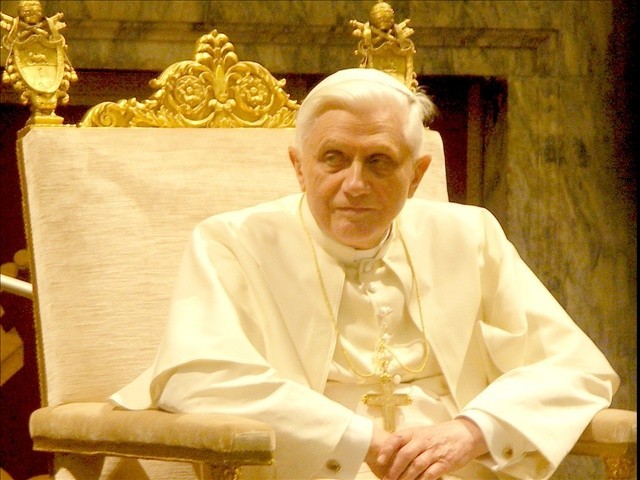VATICAN CITY (AP) -- Pope Benedict XVI responded to criticism that the club of churchmen who will choose his successor is too Eurocentric, elevating six new cardinals from Colombia, India, Lebanon, Nigeria, the Philippines and the U.S. during a formal ceremony Saturday.
Benedict welcomed the prelates into the College of Cardinals during a short, hour-long ceremony in St. Peter's Basilica, telling them that their presence among the other red-robed prelates was a sign of the "unique, universal and all-inclusive identity" of the Catholic Church.
"In this consistory, I want to highlight in particular the fact that the church is the church of all peoples, and so she speaks in the various cultures of the different continents," he told the crowd.
The ceremony was both joyful and emotional: Manila Archbishop Luis Antonio Tagle, seen by many to be a rising star in the church, visibly choked up as he knelt before Benedict to receive his three-pointed red hat, or biretta, and gold ring. He wiped tears from his eyes as he returned to his place.
The archbishop of Abuja, Nigeria, Cardinal John Olorunfemi Onaiyekan, meanwhile, seemed to want to sit down and chat with each one of the dozens of cardinals that he greeted in the traditional exchange of peace that follows the formal elevation rite.
Benedict has said that with this "little consistory," he was essentially completing his last cardinal-making ceremony held in February, when he elevated 22 cardinals, the vast majority of them European archbishops and Vatican bureaucrats.
The College of Cardinals remains heavily European even with the new additions: Of the 120 cardinals under age 80 and thus eligible to vote in a conclave to elect a new pope, more than half - 62 - are European.
Critics have complained that the "princes of the church" no longer represents the Catholic Church today, since Catholicism is growing in Asia and Africa but is in crisis in much of Europe.
The issue of numbers is significant since these are the men who will elect the next pope from within their ranks. Will the next pontiff hail from the southern hemisphere, where two-thirds of the world's Catholics live? Or will the papacy return to Italy, which has 28 voting-age cardinals, following a Polish and German pope?
While there's no rule that papal ballots are cast along geographic lines, the new cardinals do give an eventual conclave a slightly more multinational air: Latin America, which boasts half of the world's Catholics, now has 21 voting-age cardinals; North America, 14; Africa, 11; Asia, 11; and Oceana, one.
Among the six new cardinals is Archbishop James Harvey, the American prefect of the papal household. As prefect, Harvey was the direct superior of the pope's former butler, Paolo Gabriele, who is serving an 18 month prison sentence in a Vatican jail for stealing the pope's private papers and leaking them to a reporter in the greatest Vatican security breach in modern times.
The Vatican spokesman has denied Harvey, 63, from Milwaukee, is leaving because of the scandal. But on the day the pope announced Harvey would be made cardinal, he also said he would leave the Vatican to take up duties as the archpriest of one of the Vatican's four Roman basilicas. Such a face-saving promotion-removal is not an uncommon Vatican personnel move.
Harvey's departure has led to much speculation about who would replace him in the delicate job of organizing the pope's daily schedule and arranging audiences.
Aside from Harvey, Tagle, and Onaiyekan, the new cardinals are: Bogota, Colombia Archbishop Ruben Salazar Gomez; the Patriarch of Antioch of the Maronites in Lebanon, His Beatitude Bechara Boutros Rai; and the major Archbishop of the Trivandrum of the Siro-Malankaresi in India, His Beatitude Baselios Cleemis Thottunkal.
Later Saturday after the ceremony, the cardinals received visitors in the frescoed rooms of the Apostolic Palace, which opens its doors to the general public for these special cardinal-making occasions.
Cardinals serve as the pope's closest advisers, but their main task is to elect a new pope. And with Benedict, 85, slowing down, that task is ever more present. For the second time, the consistory ceremony was greatly trimmed back, lasting just over an hour to spare the pope the fatigue of a lengthy ceremony.
He will, however, celebrate Mass on Sunday with his new cardinals.
While Benedict didn't mention the cardinals' primary task in his remarks, he did remind them that the scarlet of their cassock and hat that they wear symbolizes the blood that cardinals must be willing to shed to remain faithful to the church.
"From now on you will be even more closely and intimately linked to the See of Peter," he said.
The six new cardinals are all under age 80. Their nominations bring the number of voting-age cardinals to 120, 67 of whom were named by Benedict, all but ensuring that his successor will be chosen from a group of like-minded prelates.
Saturday's consistory marks the first time in decades that not a single European or Italian has been made a cardinal - a statistic that has not gone unnoticed in Italy. Italy still has the lions' share of cardinals, though, with 28 voting-age "princes" of the church.
Thursday
April 18th, 2024
5:06AM









